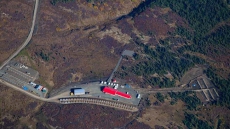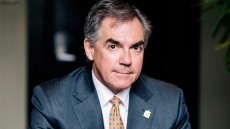RCMP officers who raced to a New Brunswick neighbourhood under siege by Justin Bourque say the force has failed to supply them with recommended guns and training, months after a report urged the organization to do just that.
Some frontline officers who spoke to The Canadian Press on the condition that they remain anonymous because they are not allowed to speak publicly say they fear for their safety because most members still do not have carbine rifles or training on how to use them.
One RCMP officer who witnessed Bourque gun down a colleague last June 4 in Moncton says the organization has moved too slowly in rolling out the carbines and training.
Another member says officers feel they are outgunned and are increasingly bitter that repeated calls for better weaponry over the last decade haven't prompted a swift response from RCMP headquarters.
"A lot of the members are disappointed ... but they've got to the point of saying, 'Well you know what, that's the RCMP. They don't give a s---t,'" said one long-serving member involved in the hunt for Bourque.
"I don't expect to see much more change. ... When it comes to the carbine being put in the vehicles, they say it's going to happen but do I expect it? No, not for a few years."
He says only four people in his detachment of about 80 members have been trained on the Colt C8 carbine, a semi-automatic weapon that is highly regarded for its accuracy and long range, and has been used for years by Canadian municipal police forces.
The RCMP moved the first carbines out in 2013, with 2,200 now available for 12,000 members. Carbine training has stepped up since last year, but the force won't reveal how many officers have been trained.
In mid-May, the RCMP was charged with violating the Canada Labour Code.
Labour investigators allege the police force didn't provide appropriate weapons and equipment for "active shooter" incidents. They also say the force didn't give staff the training and information needed to respond to incidents like Bourque's, and that the RCMP didn't "in general" ensure health and safety of its members.
The matter will be heard in court for the first time on July 9.
The latest call for a faster roll-out of the carbines came in a review from retired assistant commissioner Alphonse MacNeil after Bourque fatally shot three RCMP officers and wounded two others with an assault rifle that overpowered the members' pistols and shotguns.
MacNeil released 64 recommendations aimed at improving training, equipment, communications and planning during critical incidents, all of which were found to be deficient in the police response to the shootings.
In particular, MacNeil said the RCMP has been slow in getting carbines, adding that none of the officers who responded to the chaotic scene in Moncton had one because all six were away at a training exercise.
"The time it took to roll out the carbine project, including the training and delivery of the weapons to members of the RCMP, has taken far too long," he said in the 180-page report.
"In October, 2014, there are frontline members of the RCMP who still do not have the training and access to the carbine."
He recommended "the RCMP take immediate action to expedite deployment of patrol carbines across the force."
The RCMP accepted the recommendations, but didn't set a clear deadline for when or how many officers would get the guns.
Still, members say the force has no excuse for the slow delivery of guns that were recommended in 2010 in a RCMP-commissioned report and again in 2011 following the deaths of four officers in Alberta in 2005. The force began researching carbines in 2006 as it developed a policy on required equipment.
One New Brunswick officer who rushed to the suburban neighbourhood in pursuit of Bourque insists that having a carbine would have given police a chance to stop him.
"We knew we were going to a person that was shooting police officers with a high-powered rifle and we show up there with pellet guns basically," said the officer, who is bound by a regulation to not criticize the force.
"Carbines on June 4 was without a doubt a key factor in the outcome. ... You clearly would have had some members that had a shot at Bourque as opposed to somebody who had a handgun who says, 'I won't be able to hit him or my bullet won't go that far.' "
Grumbling over the carbine has persisted since James Roszko used a semi-automatic rifle to gun down four RCMP officers in 2005 in Mayerthorpe, Alta. A 2011 report into the shootings found the Mounties were severely outgunned and recommended they be equipped with carbines.
The Moncton slayings stoked the anger among RCMP members over both the lack of carbines and an explanation on why it's taken so long to get them. That prompted Commissioner Bob Paulson to write an internal email to members last summer that was obtained by MacLean's magazine.
In it, he reportedly says swift calls for the carbine merely "disrespect" fallen constables Dave Ross, Doug Larche and Fabrice Gevaudan and amount to "sensational" second-guessing.
He insisted the force was trying to get carbines well before the Mayerthorpe inquiry recommendations, adding that the RCMP commissioned a report in 2010 to look at the weapon but that it didn't provide the proper analysis.
The force has said procurement also slowed down the delivery.
Paulson suggested the addition of carbines had to be measured following the Taser death of Robert Dziekanski in 2007.
"We knew the addition of another deadly force option, at a time when we were being condemned for our Conducted Electrical Weapon ... would require a careful and formal analysis of the need for the carbine, together with the creation of precise policies on its use, its distribution and training," he stated in the email published by MacLean's.
Some officers say the incident stopped the roll out in its tracks.
Paulson declined an interview.
One officer who couldn't get a carbine as he searched for Bourque last June slams Paulson's claims, saying the RCMP's emergency response teams were already using them along with other forces.
"If other police forces have been using it for years, the RMCP doesn't have to spend 10 years to go through the research to come to the same conclusion," he said angrily.
"It's unacceptable to me. I know it's all about cost. There's no ifs, ands or buts about it."




